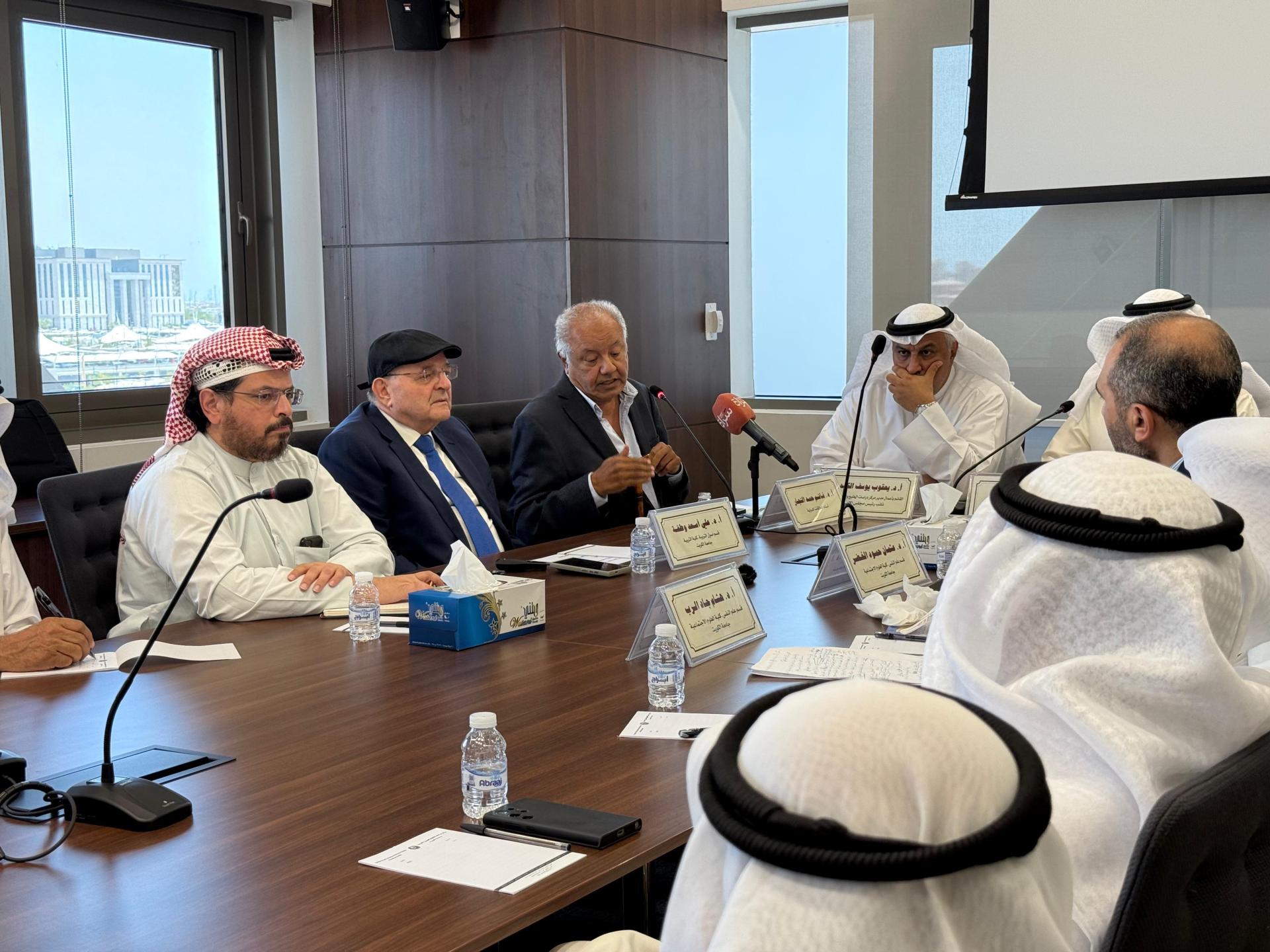
The Center for Gulf and Arabian Peninsula Studies at Kuwait University organized a specialized academic panel discussion titled “Quantitative and Qualitative Social Research in the Gulf and Arab Academic Community: Realities, Challenges, and Experiences” on Tuesday, July 15, 2025, at Sabah Al-Salem University City. The session aimed to explore the state of social research, particularly the challenges facing the Gulf academic community, the difficulties encountered by researchers in the social sciences, and the dominance of quantitative methodologies in Arab research.
The session was attended by several faculty members from the College of Social Sciences and other colleges and was moderated by Dr. Mohammad Muhanna Al-Sahali, Acting Editor-in-Chief of the Journal of Gulf and Arabian Peninsula Studies at Kuwait University.
Prof. Ghanem Hamad Al-Najjar, Professor of International Relations and Political Science at the College of Social Sciences, emphasized the need to distinguish between scientific research and policy-oriented studies, stating that the former does not necessarily yield policy recommendations as it is not grounded in public policy frameworks. He stressed the importance of applying theories and concepts in a realistic and non-random manner.
He also noted that artificial intelligence has sparked a technological revolution in the field of information, and it is expected to render many link-based research tools obsolete. Many users now seek quicker answers, and even basic AI applications have outperformed platforms like Google in response speed. He added that we are entering a new era in social research, especially concerning the challenges facing Gulf societies and the quantitative research tools that dominate the field, along with the difficulties social science researchers face.
Prof. Baqer Al-Najjar, faculty member in the Department of Sociology and Social Work, discussed the major challenges facing academics in the region that hinder the quality and productivity of scientific research.
He said: “Through qualitative research, I have attempted to present a clear picture of the state of social science colleges in Gulf universities. The findings reveal that there are approximately 65 social science departments across public and private Gulf universities, with over 700 professors and faculty members contributing to policy formulation in some countries, albeit with limited capacity.”
He further pointed out that in some Gulf universities, the teaching load exceeds what is feasible for faculty to conduct meaningful research. This pressure often drives researchers to choose simpler research designs—namely, quantitative studies, which are easier to execute using surveys administered to students.
He highlighted that the most significant academic journal in the Arab world for social sciences is the Journal of Social Sciences published by Kuwait University, with four issues annually. While the journal is widely circulated across the Arab region, few of its studies are cited, despite their depth of analysis and scientific rigor.
In a related context, Prof. Othman Al-Khadhir, from the Department of Psychology at the College of Social Sciences, stated that social research should not be limited to quantitative or qualitative methodologies. He noted that research in the Arab world in general—and at Kuwait University in particular—tends to favor quantitative, especially descriptive, studies, with significant neglect of experimental and longitudinal studies. This, he warned, negatively impacts the quality of academic research. He further stressed that many current studies are of limited value, lacking originality, rigor, and creativity, with an overreliance on ready-made questionnaires. Qualitative research remains underutilized and is often based on pre-prepared reports.
Meanwhile, Prof. Ali Wutfa, from the Department of Foundations of Education at the College of Education, added that a deep analysis of the qualitative and quantitative dichotomy in the humanities and social sciences must occupy a substantial space in academic and educational research discourse. He argued that ideological critiques of quantitative methodologies, along with their dominance in Arab research, should be openly discussed. He affirmed the authenticity of qualitative approaches in social studies and noted the ideological underpinnings inherent in sociological research methodologies.
The session concluded with an open floor for questions and a rich exchange of academic perspectives on the topic from faculty members at Kuwait University, as well as scientific, social, and research figures.


 Colored
Colored Grayscale
Grayscale

